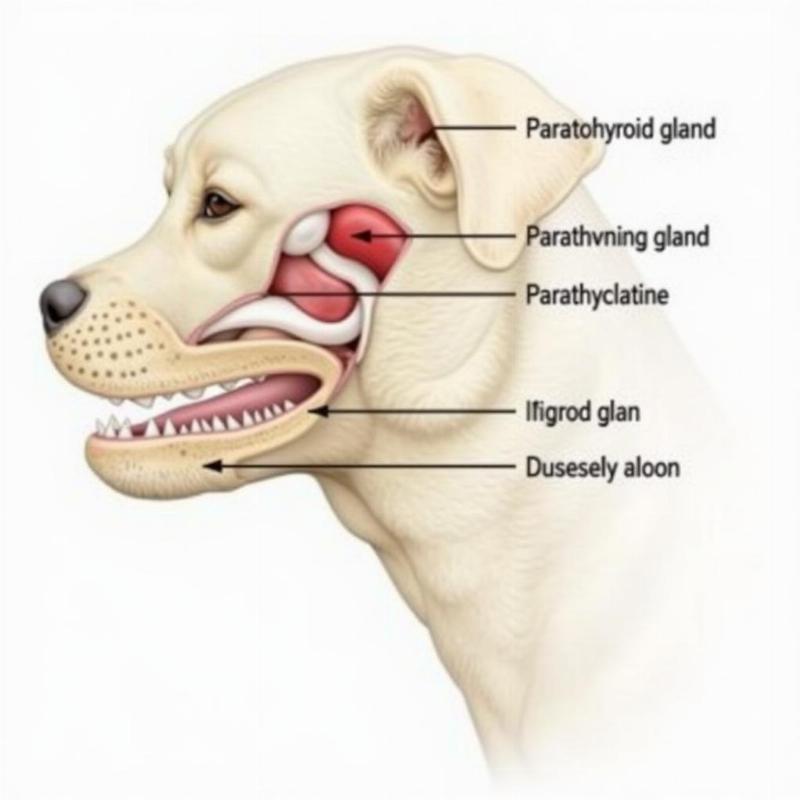Parathyroid gland tumors in dogs, though relatively rare, can significantly impact a dog’s health. These tumors, located near the thyroid gland in the neck, disrupt calcium regulation, leading to a condition called hypercalcemia (high blood calcium). Understanding the causes, symptoms, and treatment options for parathyroid gland tumors is crucial for any dog owner.
What are Parathyroid Gland Tumors?
Parathyroid glands are small but vital endocrine glands responsible for producing parathyroid hormone (PTH). PTH regulates calcium levels in the blood. When a tumor develops on one or more of these glands, it can cause excessive PTH production, leading to hypercalcemia. This imbalance can have far-reaching effects on various bodily systems.
 Dog's Parathyroid Gland Location
Dog's Parathyroid Gland Location
Hypercalcemia caused by parathyroid tumors can affect the kidneys, digestive system, and even the nervous system. Early detection and treatment are critical for managing the condition and preventing severe complications.
Recognizing the Symptoms of Parathyroid Gland Tumors
Symptoms of parathyroid gland tumors in dogs can be subtle initially and often mimic other conditions. This makes diagnosis challenging. Common signs include increased thirst and urination, loss of appetite, vomiting, lethargy, and weakness. As the condition progresses, dogs might experience more severe symptoms like muscle tremors, seizures, and kidney stones.
If you notice any of these symptoms in your dog, it’s crucial to consult a veterinarian. Early diagnosis can significantly improve the outcome.
Diagnosing Parathyroid Gland Tumors
Diagnosing a parathyroid gland tumor requires a combination of blood tests, urine analysis, and imaging techniques like ultrasound or scintigraphy. Blood tests reveal elevated calcium and PTH levels, while urine analysis helps assess kidney function. Imaging helps locate and characterize the tumor.
Treatment Options for Parathyroid Gland Tumors in Dogs
Surgical removal of the tumor is the primary treatment for parathyroid gland tumors. This procedure, known as parathyroidectomy, often resolves hypercalcemia and its associated symptoms. In some cases, medications might be prescribed to manage calcium levels before or after surgery.
Post-surgical monitoring is essential to ensure calcium levels return to normal and the tumor hasn’t recurred. Regular check-ups with your veterinarian are crucial for long-term management.
Conclusion
Parathyroid gland tumors in dogs, while concerning, are treatable. Early detection and intervention are key to managing the condition and improving the dog’s quality of life. If your dog exhibits any symptoms suggestive of hypercalcemia, consult your veterinarian immediately. Prompt diagnosis and treatment can lead to a positive outcome.
FAQ
- How common are parathyroid gland tumors in dogs? Parathyroid gland tumors are relatively rare in dogs.
- Are certain breeds predisposed to these tumors? There is no known breed predisposition for parathyroid gland tumors.
- What is the prognosis for dogs with parathyroid gland tumors? With appropriate treatment, the prognosis is generally good.
- Are there any preventative measures for parathyroid gland tumors? Unfortunately, there are no known preventative measures.
- What is the typical recovery time after parathyroidectomy? Recovery time varies, but most dogs recover within a few weeks.
Beautdogs.us – Your Trusted Partner in Dog Care
Beautdogs.us is your one-stop resource for all things dog-related in the US. We provide expert advice on dog breeds, care, and lifestyle. Whether you’re a new dog owner or a seasoned enthusiast, Beautdogs.us provides comprehensive and engaging information to help you navigate the joys and challenges of dog ownership. We are committed to offering authoritative yet accessible content, making us your trusted source for all your canine needs. Contact us today for personalized advice and support! Email: [email protected], Phone: +1 501-555-7529.